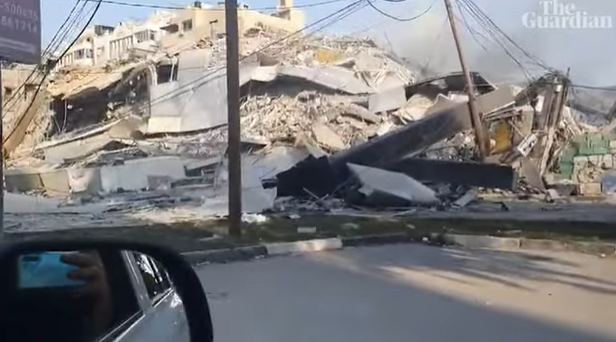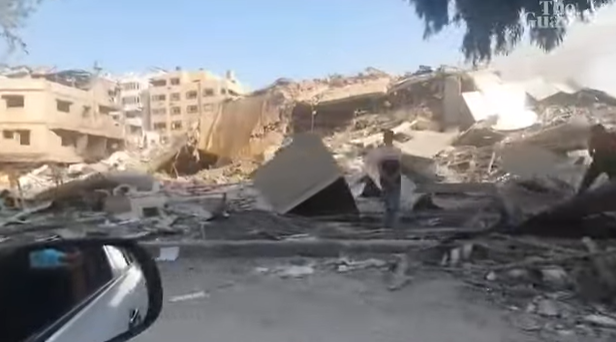1. 알 자지라. 보도.
https://omny.fm/shows/the-inside-story-podcast/why-has-politics-failed-badly-in-the-israel-hamas
Why has politics failed badly in the Israel-Hamas war? - The Inside Story Podcast
Hundreds of civilians killed and injured in Israeli attacks on Gaza. The government declares a total siege - fighting what it calls 'human animals'. Earlier, hundreds of Israelis were killed by Palestinian fighters. Why has politics failed so badly? What's
omny.fm
2. 가디언
2023.oct.15 이스라엘 군대 가자 지구 폭격. View from Gaza- ‘I can’t leave. It’s horrific that I have to choose between my life and my home’
Manchester scientist Mohammed Ghalayini was visiting his family in the enclave when Israeli missiles struck – and now he is staying by their side
Israel and Hamas at war – live updates and latest news
Ruth Michaelson
Sun 15 Oct 2023 05.00 BST
Mohammed Ghalayini awoke to the sound of outgoing rocket fire. It was 6am on Saturday 6 October, and his first thought was how surreal the rockets sounded in the beautiful morning sky over Gaza City.
He soon saw that things were going to be different this time, not like the previous Israeli attacks on the enclave. “When I saw videos of Israeli hostages being brought into Gaza and Israeli military vehicles that had been seized, I twigged it was something big,” he said. Ghalayini, his mother Mona, and his sister Sondos fearfully wondered whether they should move.
As they mulled their options, they heard a loud bang and the sound of shattering glass – a building just 100 metres away had been hit. They and their neighbours fled their apartments on the 10th floor of a building on the Gaza seafront, fearing they were too exposed to what they knew was about to come.
Mohammed Ghalayini films Israeli rockets from his balcony in Gaza – video
The buzz of drones intensified overhead as they filled their overnight bags with passports, medications and as many books, clothes, toiletries and chargers as they could carry. “It’s hard to leave your home not knowing if you’ll have a home to come back to,” he said. He didn’t realise this would be the first of three times he would flee in just one week.
Mohammed Ghalayini in the Mashtal hotel in Gaza City.
Ghalayini, 44, an air quality scientist living in Manchester, had returned to his hometown of Gaza City in September, intending to stay three months. He was on a career break, he said, and had wanted to reconnect with his father and half-brothers. “It was an opportunity to spend a significant period at home, reconnecting with family and friends. Travel to Gaza is hard because of Egyptian and Israeli restrictions, so I’d only visited three times in almost 20 years, and always less than a month.”
He felt a sense of responsibility to use his work to connect with others in Gaza, trying to improve the acrid air that hangs over the densely-populated enclave of 2.3 million people.
Most are crammed into concrete tower blocks amid a 16-year blockade of the Gaza Strip. “I’d been preparing a research seminar, considering who to invite. Now it’s all up in the air, as is mere survival in Gaza,” he said, the day after Israel began airstrikes following the incursion by Hamas militants that has now killed more than 1,300 Israelis.
From the first evening, Ghalayini noticed the intensity of the airstrikes around him. He tried to figure out the rhythm of the bombs from the jets, seeing the bright glow of each strike and the shaking of the ground below alongside the smaller strikes from the ever-present drones.

Mohammed Ghalayini films destruction in his neighbourhood after Israeli strikes – video

His mother and sister fled over the Rafah border, crossing into Egypt on Sunday after his mother secured permission to leave at the last minute.
“She’s an absolute force,” he said of his mother. “It was important for my sister to leave as she was finding the bombardment really difficult for her nerves.” He described the constant buzz of the drones as “harbingers of doom”.
On Monday, Ghalayini sought shelter with his father above his health centre in Gaza City. The two weighed up fleeing for a hotel further north, hoping it might be safer. Israeli officials had announced a “complete siege” of the strip, cutting off its water, power and fuel. Ghalayini tried to feed the three cats at his father’s apartment, irritated that the youngest was so frightened of the bombs that she didn’t want to eat.
By Tuesday morning, Ghalayini noticed at breakfast that the Mashtal hotel, to which he, his father, his uncle and some of his cousins had fled, had begun rationing food supplies. The hotel supplied three sandwiches per person, one with meat, a second with hummus and the third with labneh, a kind of strained yoghurt.
He and his family had brought supplies too: bread, cheese, water, salami, dates and ramen. He was already mixing the bottled water with Gaza’s salty tap water to get used to the lower quality.
The following day, Gaza’s sole power plant shut down. Ghalayini received a text from a friend, describing news of discussions about a humanitarian corridor to allow Palestinians to exit Gaza.
He was furious: why were the discussions about allowing Palestinians to exit, and not on stopping the bombs that were raining down on the enclave?land, sea and air. “It made my blood boil. We don’t want more dispossession,” he fumed.
A wounded girl is carried from the site of an Israeli strike on Khan Yunis.
A wounded girl is carried fr

om the site of an Israeli strike on Khan Yunis. Photograph: Yasser Qudih/Reuters
The bombing of Gaza intensified, and more of their family fled to the hotel. All that remained of a building where Ghalayini recalled happy childhood memories was a pale concrete doorframe around a black metal door that now led to nowhere, jutting up from a pile of rubble.
On Thursday, he and his family sheltered in the hotel after news of a nearby “fire belt”, their name for an intense wave of strikes that destroys whole city blocks.
Footage shows remnants of Mohammed Ghalayini’s building after Israeli airstrikes – video
00:00:36

Footage shows remnants of Mohammed Ghalayini’s building after Israeli airstrikes – video
Friday morning brought a new kind of shockwave: Ghalayini awoke to news that the Israeli military had ordered the entire population of northern Gaza, 1.1 million people, to flee south. They said they had sent text messages, warning people in Arabic: he had not received one, and so began asking people nearby and texting friends outside Gaza to see if the news was true.
At the Mashtal hotel, the scene was chaos as hundreds of people sheltering in the lobby and corridors tried desperately to figure out where the nearest safe place might be, whether a nearby hospital had any room left. Confused and terrified, his family piled into a car with whatever they could carry and fled for Khan Yunis in the south of the enclave.
By Saturday, news trickled in that some, including dual nationals such as Ghalayini, could be allowed to cross into Egypt. Despite it all, Ghalayini was deeply conflicted about the idea of leaving. He thought of some lines from a poem: “I miss my mother’s bread and my mother’s coffee. If I die, I will be ashamed of my mother’s tears.”
“My uncle and aunt and cousins are here. I can’t leave them here to their fate,” he said. “I feel I have work to do here. It’s horrific that I have to make a choice between my life and my home.”


